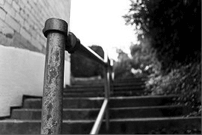Call or email us. It’s completely confidential.
Speak to a lawyer about your situation for free.
We give you advice and/or a lawyer referral.
Injury Caused By Missing Or Defective Handrails
We are experienced Illinois attorneys who since 2001 have helped people find the best Illinois personal injury lawyer for their case. You can call our office at 312-346-5320 or 800-517-1614 to speak with a lawyer for FREE or you can fill out our contact form and we will contact you.
 If you get hurt going down stairs that have a defective handrail or none at all, then you may be able to hold the building owner, manager or maintenance company responsible for your injuries. If they knew of a defect and failed to warn you or fix it, or if the handrail did not meet the proper building codes, you can sue for damages, including medical bills and other costs of your recovery.
If you get hurt going down stairs that have a defective handrail or none at all, then you may be able to hold the building owner, manager or maintenance company responsible for your injuries. If they knew of a defect and failed to warn you or fix it, or if the handrail did not meet the proper building codes, you can sue for damages, including medical bills and other costs of your recovery.
These accidents can happen anywhere – your apartment building, your place of employment, the public library, a retail store, a bar or restaurant, a parking lot, etc. These are known as premises liability cases. In a premises liability case, a person is hurt on someone else’s property and they file a lawsuit claiming that the property wasn’t kept in a safe enough condition or that there wasn’t proper warning of a hazardous condition.
There are several different building codes that might apply in a case involving a defective or missing handrail. It’s important to hire an attorney who is familiar with these laws. If you can point to a code violation, your case can be easier to prove. An experienced attorney will know how to quickly investigate the premises, take photographs and measurements, and identify potential witnesses.
Building codes are specific and set requirements for things like the width of a railing, the length of a railing, the distance between the railing and the wall, whether railings are required on one or both sides of a particular stairway, how the railings are attached to the wall, whether they extend beyond the last step, etc. These laws are in place with day-to-day use in mind, as well as emergency situations, when a quick exit is required. For example, on most stairways, the gripping surface of the handrail needs to be a smooth, continuous, uninterrupted surface so that you can slide your hand down the entire rail without having to let go.
Balconies and other elevated areas must have guardrails. Codes require these guardrails to be a certain height and free from parts that a child could climb on. The individual bars on a balcony railing can’t be too far apart, which is meant to prevent a child’s head from fitting through the spaces.
What Clients Are Saying
"Took a chance"
I didn’t know where to turn to or where to go. I took a chance and ended up with a lawyer that looked out for me at every turn and still is available to me.
"Fast response"
Wow, what a fast response! You got me on the right track.
Premises liability cases are based on negligence. You can prove negligence by showing that the property owner violated a building code, created the hazard (incorrectly installed a handrail), failed to fix a known problem, or failed to fix a problem that they should have known about (something obvious or that has existed for a long time).
You have two years to file a lawsuit in an Illinois personal injury case. Many cases settle after the attorney for the injured person negotiates with the property owner’s insurance company. However, you do not have to settle. Your attorney should be willing to take your case to trial if necessary, which is a decision that should be based on what’s best for you.
Premises liability attorneys charge on a contingency basis, which means that there only is a fee if your case is successful. If you have any questions about whether a property owner can be held responsible in your case, please contact us.
Since 2001, illinoislawyers.com has been the leading resource for Illinois premises liability lawyers. From Chicago falls on stairs, to accidents in hotels or buildings in other parts of Illinois and any other injuries related to negligence of another we are like having a lawyer in the family.
